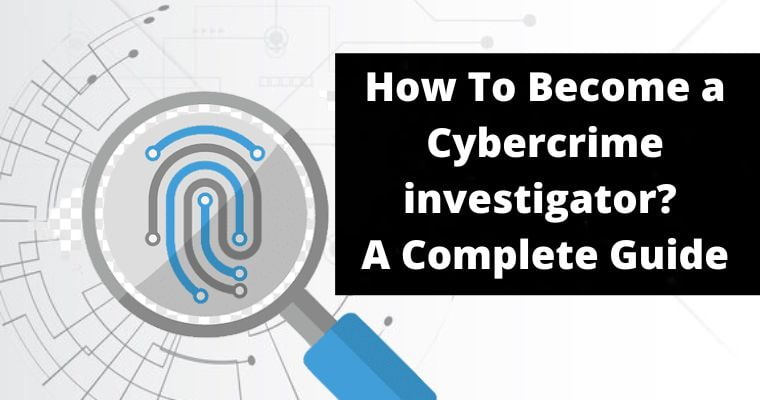Cyber Crime Investigation 101: Everything you need to know
A cybercrime investigator’s primary focus is on collecting information from automated technologies that can be used to investigate internet-based, or cyberspace, illegal activity.
Many crimes in today’s world include the use of the internet. A cybercrime agent may be used to collect critical information to aid in the investigation of these crimes.
Although cybercrime investigator possesses and employs much of the same abilities as data forensics investigator, they are more focused on and at solving offenses that use the internet as the primary attack vector.
The cybercrime agent is in charge of detecting cyber-attacks perpetrated by hackers, foreign rivals, and terrorists. Cybercriminals pose a substantial and dangerous threat. Cyber intrusions are getting more frequent, dangerous, and sophisticated.
Each and every minute of every day, cyber adversaries threaten both private and public sector networks.
Organizations are targeted for their trade secrets and other classified information, while universities are targeted for personal research and development. Hackers (or Identity thieves) prey on people, and cyber predators prey on youngsters.
The opportunity to store and restore digital data will be vital to successfully prosecute these crimes.
Table of Contents
Cybercrimes around the World: A Rough Insight!
Cybercrime is surging, with a record 8% increase in global cyberattacks in the second quarter of 2023.
Cybersecurity Ventures estimates the global cost cyber crimes around the world to reach a staggering $8 trillion in 2023, a 15% increase from the previous year. This translates to losses of $21.9 billion every day.
Cybercrime has evolved into a sophisticated and a growing threat in 2023, inflicting significant damage on individuals, businesses, and even critical infrastructure.
However, investigating these types of offenses can be difficult and time-consuming. The cybercrime detective (who is the super sleuth of computers) is in charge of investigating the harm caused by cybercrime operations.
Why are Cybercrimes spiking North?
One of the reasons cybercrimes are on the rise is the increased use of cloud services to store confidential data.
Most companies lack the storage and infrastructure necessary to keep all of their sensitive data in stable, off-site data storage facilities.
Even if they did, it would be challenging to discourage people from using cloud services for their day-to-day business activities.
If a company wants it or not, whether it likes it or not, business customers are almost certainly still relying on cloud services.
Data theft is the sneakiest and fastest-growing category of cybercrime. Industrial controls that operate power grids and other infrastructure may be disrupted or destroyed.
And while identity theft is not the only goal, cyber-attacks can compromise data integrity (data destruction or alteration) in breeding distrust of an organization or government but the latter can employ cybercrime investigators to find the hackers.
Ransomware and phishing are the most common among all vulnerable vectors, but social engineering remains the most common cyber-attack method.
Another popular attack vector is third-party and fourth-party vendors that process your data and have weak cybersecurity practices, making vendor risk management and third-party risk management much more essential.
Since cloud resources are distributed, they are often stored in data centers worldwide for reasons of availability and redundancy.
Cyber Investigator: What does he do?
The title “cybercrime detective” pretty much sums up what the work entails. It’s a career at the crossroads between coding and law enforcement.
A cybercrime investigator conducts the technical equivalent of a criminal investigation and usually enters a scenario after a security breach has occurred.
Cybercrime encompasses a wide range of issues, and a cybercrime investigator may specialize in one or more of these areas.
A cybercrime analyst will also serve as part of a consulting firm, providing services to both businesses and law enforcement. They can also work specifically with a law enforcement agency such as the Federal Bureau of Investigations (FBI) or Europol.
Cybercrime encompasses a broad and diverse range of activities. They range from data theft to cyberstalking and darknet crimes like drug smuggling.
The position can also include involvement in sex trafficking and child violence, which may be emotionally draining.
Data collection and interpretation are essential aspects of the work of a cybercrime prosecutor.
This could involve gathering data that may otherwise be incredibly difficult to obtain because the source has been compromised or even purposefully lost.
This is a critical requirement of the job and necessitates the use of specialized computing skills.
Cybercrime detectives search for information and determine the cause of a cybercrime event.
When investigating a data breach, for example, the detective will search for the origin of the breach, the nature of the attack that occurred, the vector used to perpetuate the attack, and all other facts to establish the anatomy of the incident.
This will then be used to identify vulnerable points in a system to help close security holes.
A cybercrime detective will often be required to use traditional investigative skills in addition to digital forensics.
For example, interviews and monitoring may be used to supplement electronic inquiries by investigating employees’ actions and those who may access classified information.
Since cybercrime typically involves people, these skills are an essential part of the job.
Since cybercrime detectives are specialists in their profession, they can be called to testify in court as expert witnesses. In that scenario, the prosecutor will also be required to write expert analyses, most likely highly scientific.
These findings will surely lay the foundation for the testimony shown in the courtroom.
A cybercrime detective must be an excellent communicator and team member due to all of the human-touchpoint facets of the job.
Getting Started With Cybercrime Investigation!
If you’ve obtained your degree and/or credential, you’ll be able to find work as a cybercrime investigator. For seasoned prosecutors, jobs in this profession may pay up to $98,350 a year. Data forensics and cybercrime analysis jobs are posted in the usual ways.
You can, though, find internships to help you climb the corporate ladder. The FBI has a branch called “Cyber” that investigates cyber threats and assaults.
The particular division investigates all forms of cybercrime, including counterterrorism and domestic offenses. For internships and careers, visit the FBI’s website.
Cybercrime analysts are there as a shield on the frontline, to fight against the gruesome cybercrimes. Without them, we could have only imagined defending the systems from cyber attacks.
Advancing Ahead: A Detailed RoadMap
To become a cybercrime investigator, you must have a mix of qualifications and experience. This education and experience, or a mixture of the two, can be in cryptography and investigations.
Formal education
A bachelor’s degree in criminal justice or cryptography is usually expected to work as a cybercrime investigator.
Any community colleges offer two-year associate degrees in criminal justice, allowing prospective cybercrime officers to move to a four-year university or college to achieve a bachelor’s degree.
A degree in computer science is also advantageous for jobs as a cybercrime investigator.
Choosing a Career
A typical career path for this investigation specialization involves working as an integral member of a cybersecurity team for many years.
Solid knowledge of cybersecurity protections provides the candidate with a foundation for understanding how cybercriminals would respond in several situations. Studying in a discipline that has helped the candidate develop forensic expertise is vital in the industry.
Professional accreditations
Although no industry-wide technical credential is needed for a cybercrime investigator, two certifications stand out as desirable qualifications.
The Certified Information Systems Security Professional (or the CISSP) credential shows that a candidate understands security infrastructure, engineering, and management.
The Certified Ethical Hacker (CEH) also reveals a thorough understanding of cyberattacks and prevention strategies.
Mustering Experience
Since the knowledge base needed to be an effective cybercrime investigator is cross-functional in several ways, this is a job ideally fit for an advanced cybersecurity or criminal investigations specialist.
And if an applicant graduates from college with either of the above bachelor’s degrees, he or she is unlikely to have the necessary expertise in both cybersecurity and investigations.
Experience in the field would help you supplement your cybersecurity expertise with a good understanding of investigative principles and procedures, or vice versa.
To become a cybercrime investigator, you must have a mix of qualifications and experience. This education and experience, or a mixture of the two, can be in cryptography and investigations.
Cybercrime Investigator: Skills and Experience
Cybercrime investigation is a multi-functional job position that requires both forensic tactics and cryptography expertise to properly collect and protect evidence for later trials.
It is necessary to be able to operate in a multi-jurisdictional or cross-jurisdictional setting. The nonlocal nature of cybercrime is a critical factor. Illegal activities may take place in jurisdictions that are thousands of miles apart.
This presents significant obstacles for cybercrime investigations since these crimes often necessitate international collaboration.
For example, if a person accesses child pornography on a computer in a country that does not prohibit it, is that person committing a crime in a country where those materials are not permitted?
The cybercrime analyst must be qualified to inquire and answer questions about the specific location of cybercrime.
Cybercrime Investigator: Job Roles and Responsibilities
While a detective or law enforcement officer can investigate various crimes, a cybercrime investigator focuses only on cyber, or internet-based, crimes.
A cybercrime detective investigates a wide variety of offenses, from retrieving file systems on stolen or compromised servers to investigating violence against children.
Furthermore, cybercrime agents recover evidence from servers that can be used in criminal prosecution.
After gathering the requisite electronic data, cybercrime analysts write papers that can be presented in court. Cybercrime investigators are also required to appear in court.
Cybercrime analysts can also work with major companies to test existing security programs. Investigators do this by attempting different methods of hacking through the corporation’s computer networks.
Job duties can include the following:
- Analyzing operating infrastructure and networks in the aftermath of a robbery.
- Recovering data that has been lost or corrupted.
- Obtaining proof
- Compiling device and network data.
- Rebuilding cyberattacks
- Working in a multijurisdictional or cross-jurisdictional setting
- Creating expert reviews on highly technical issues.
- Giving testimony in court.
- Law enforcement officers are being trained on cybercrime-related topics.
- Expert testimony, affidavits, and findings are all written by me.
- Clients, bosses, and administrators have all consulted.
- Via research and preparation, I am constantly honing my investigation and cybersecurity expertise.
- Recovering password-protected/encrypted files and material that has been hidden.
- Detecting vulnerability bugs in desktop programs, networks, and endpoints.
- Identify and propose strategies for proof retention and display.
- The desire to interact and communicate effectively as part of a team.
Certifications in Cybercrime Investigation
Since cybercrime investigation is a forever-evolving area, the best information technology experts are lifelong learners. Certifications allow you to show your understanding of the most recent developments in cybercrime investigation.
Earning a few certifications to complement your degree is a great way to stand out as a career seeker.
Here are a few of the most standard Cybercrime Investigator certifications:
- Ethical Hacker Certification (CEH)
- Computer Examiner Certification (CCE)
- Examiner for Computer Forensics Certification (CCFE)
- Analyst in Reverse Engineering Certification (CREA)
- GIAC Incident Handler Certification (GCIH)
- Certified Forensic Analyst by GIAC
Since certifications in this field are highly technical, these would be more important to your career and the area you work in than others.
Any certificates and pieces of training, for example, are only recommended for agents working for law enforcement authorities.
This includes Digital Forensics Training from the National Institute of Justice and workshops from the National Computer Forensics Institute.
Cybercrime Investigators: Outlook
Because of the early and pervasive use of computers and the internet in the United States, Americans were among the first victims of cybercrime.
By the twenty-first century, there was scarcely a culture on the planet that had not been affected by any kind of cybercrime. Today, there is a global and increasing need for cybercrime investigators.
Unfortunately, there are no signs that the need for cybercrime investigators will decrease soon.
The prevalence of illicit activities on the internet, such as data stealing, spamming, email stalking, and unauthorized copyrighted content copying, would raise the need for investigators.
As a result, opportunities for cybercrime analysts are expected to be outstanding.
Estimated Cybercrime Investigator Salary in the US?
The salary of Cybercrime investigators can vary depending on several factors, but here’s a breakdown to give you an idea:
Average Salary:
- ZipRecruiter: $84,905 per year (as of December 2023)
- Glassdoor: $120,471 per year (based on user submissions)
- Indeed: $139,513 per year (specifically for US Department of the Treasury)
According to the BLS, demand for this closely related specialization is expected to rise 32.1% from 2019 to 2028, far faster than the national average for all occupations.
According to other reports, career growth would be at least 22 percent (the expected growth rate for private investigator jobs) and likely higher than 27 percent (the projected rate of growth of computer-support-related employment).
Cybercrime Investigation: The Key Takeaways!
Cybercrime Investigators are essential in investigating computer-related crimes and apprehending those responsible. The work necessitates a highly specialized skill set and a simple, critical mind, all of which you can master with a four-year degree.
You should have a bachelor’s degree in a subject like a computer science or information technology to attract recruiting managers and recruiters.
However, some employers will also look for more specialized qualifications, such as certifications or a master’s degree, particularly if you’re applying for a higher-level position.
There is a lot of huss and fuss about the importance of a cybersecurity degree. Still, work postings show that companies are not overwhelmingly interested in recruiting applicants with a four-year degree.
That is, if you meet their degree criteria, you would have the best chance of being recruited as a cybercrime investigator.



